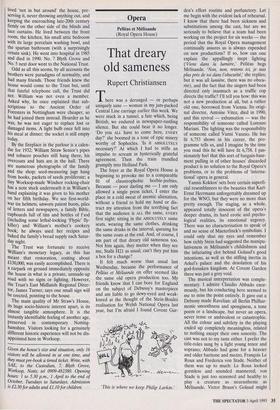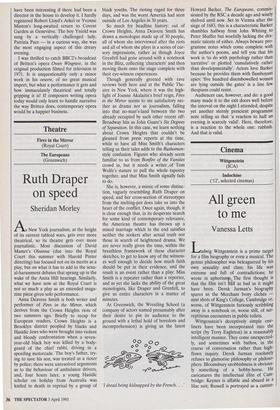Opera
Pellkas et Melisande (Royal Opera House) That dreary
old sameness
Rupert Christiansen
There was a deranged — or perhaps uniquely sane — woman in my jam-packed Central Line carriage earlier this week. We were stuck in a tunnel, a fate which, being British, we endured in newspaper-rustling silence. But she could bear it no longer. 'Do you ALL have to come here, EVERY day?' she boomed in a tone of epic misery worthy of Sophocles. 'Is it ABSOLUTELY necessary?' At which I had to stifle an impulse to scream in hysterically grateful agreement. Then the train trundled grumpily into Holland Park.
The foyer at the Royal Opera House is beginning to provoke me to a comparable fit of claustrophobic heebie-jeebies. Because — poor darling me — I am only allowed a single press ticket, I enter the place in a cold sweat of anomic alienation, without a friend to hold my hand or dis- tract my attention from the terrifying fact that the audience is ALL the same, EVERY first night: sitting in the ABSOLUTELY same seats, wearing the same clothes, drinking the same drinks in the interval, queuing for the same coats at the end. And, of course, I am part of that dreary old sameness too. Not him again, they mutter when they see me, Stalls H21 as usual; can't they put him a box for a change?
It felt much worse than usual last Wednesday, because the performance of Pelleas et Melisande on offer seemed like the same old opera production too. My friends know that I can bore for England on the subject of Debussy's masterpiece and am liable to go dewy-eyed and weak- kneed at the thought of the Stein-Boulez realisation for Welsh National Opera last year, but I'm afraid I found Covent Gar- 'This is where we keep Philip Larkin.' den's effort routine and perfunctory. Let me begin with the evident lack of rehearsal. I know that there had been sickness and substitutions among the cast, but are we seriously to believe that a team had been working on the project for six weeks — the period that the Royal Opera management continually assures us is always expended on new productions? If so, how can one explain the appallingly inept lighting Wiens dans la lumiere,' Pelleas begs Melisande. 'Non, non, restons ici, je suis plus pres de toi dans l'obscurite,' she replies; but it was all lumiere, there was no obscu- rite), and the fact that the singers had been directed only inasmuch as a traffic cop directs the traffic? I'll tell you how: this was not a new production at all, but a rather old one, borrowed from Vienna. Its origi- nal director, Antoine Vitez, died in 1990, and this revival — exhumation — was the responsibility of someone called Lorenzo Mariani. The lighting was the responsibility of someone called Vanni Vannio. He has lit 6,753 shows in his career, the pro- gramme tells us, and I imagine by the time you read this he will have lit 6,758. I pas- sionately feel that this sort of bargain-base- ment pulling in of other houses' discarded product is no solution to the Royal Opera's problems, or to the problems of 'interna- tional' opera in general.
Yannis Kokkos' sets bore certain superfi- cial resemblances to the beauties that Karl- Ernst Herrmann unforgettably dreamed up for the WNO, but they were no more than pretty enough. The staging, as a whole, appeared totally innocent of the opera's deeper drama, its hard erotic and psycho- logical realities, its emotional urgency. There was no characterisation to speak of and no sense of Maeterlinck's symbolism. I could only shut my eyes and remember how richly Stein had suggested the manipu- lativeness in Melisande's childishness and the infuriating clot behind Golaud's good intentions, as well as the stifling inertia in Arkel's palace and the desolation of his god-forsaken kingdom. At Covent Garden there was just a grey void.
The musical interpretation was comple- mentary. I admire Claudio Abbado enor- mously, but his conducting here seemed to me to miss the point entirely. It gave out a Debussy made Ravelian: all Berlin Philhar- monic smoothness and sponginess, a tone poem or a landscape, but never an opera, never tense or ambivalent or catastrophic. All the colour and subtlety in the playing ended up completely meaningless, related to nothing except their own sonority. The cast was not to my taste either. I prefer the title-roles sung by a light young tenor and soprano; Abbado had gone for a heavier and older baritone and mezzo, Francois Le Roux and Frederica von Stade. Neither of them was up to much: Le Roux looked gormless and sounded mannered; von Stade is just too seasoned and healthy to play a creature as neurasthenic as Melisande. Victor Braun's Golaud might have been interesting if there had been a director in the house to develop it. I hardly registered Robert Lloyd's Arkel or Yvonne Minton's long-awaited return to Covent Garden as Genevieve. The boy Yniold was sung by a vertically challenged lady, Patrizia Pace — in a curious way, she was the most engaging aspect of this dreary evening.
I was thrilled to catch BBC2's broadcast of Britten's opera Owen Wingrave, in the original production filmed for television in 1971. It is unquestionably only a minor work in his oeuvre, of no great musical import, but what a performance it gets and how immaculately theatrical and totally gripping it is! If composers writing opera today would only learn to handle narrative the way Britten does, contemporary opera would be a happier business.



















































 Previous page
Previous page